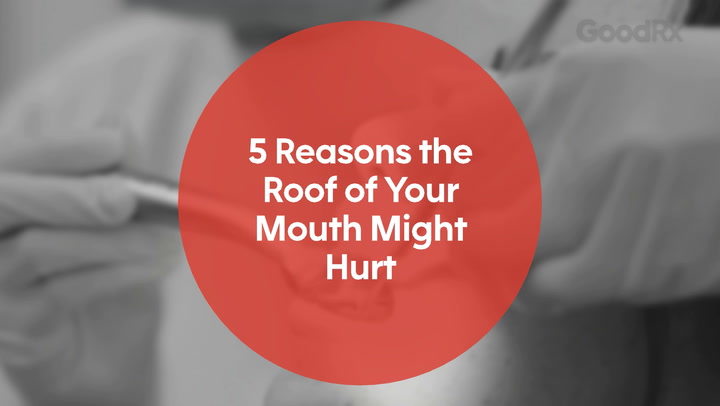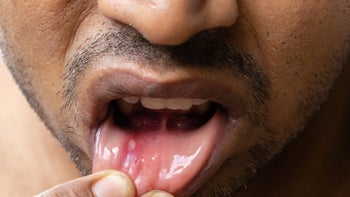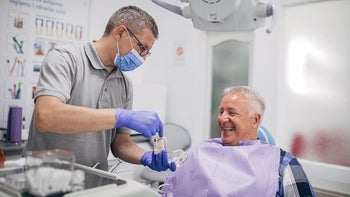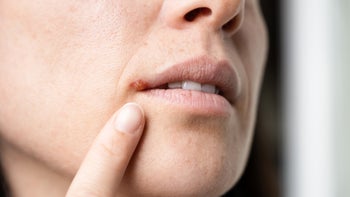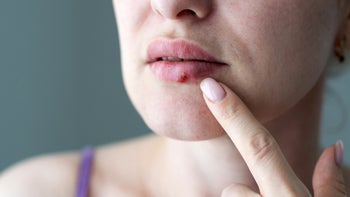
6 Home Remedies That Stop Tonsil Stones From Coming Back
Key takeaways:
Tonsil stones (tonsilloliths) form when bacteria or food particles build up in the tonsils. You may experience bad breath, sore throat, and trouble swallowing from tonsil stones.
You can lower your chance of developing tonsil stones by staying hydrated and not smoking.
Other natural remedies that can prevent tonsil stones include warm saltwater gargles and alcohol-free mouthwashes.
Table of contents

Your tonsils are two small areas of lymph tissue that sit in the back of your throat. Your tonsils help stop infections by catching bacteria and viruses before they can get to the rest of your body.
Tonsil tissue folds on itself, creating crevices. Some people have deeper crevices than others. While these crevices are natural, they’re also a place where bacteria, old cells, and tiny food particles build up. Tonsil stones (tonsilloliths) form when calcium deposits on things that are stuck inside these crevices.
Tonsil stones aren’t always a cause for concern. In fact, most people with tonsil stones don’t experience any symptoms. But other people aren’t so lucky.
Search and compare options
Tonsil stones can lead to symptoms like bad breath, sore throat, and trouble swallowing. And getting rid of tonsil stones isn’t always easy. Preventing tonsil stones from forming can help you avoid these symptoms. Here are six tips to help you avoid tonsil stones.
1. Brush and floss every day
Good oral hygiene is important for your dental health. Brushing your teeth twice daily and flossing at least daily prevents cavities and bad breath.
Brushing and flossing lowers the amount of bacteria in your mouth. That means you have less bacteria that might get into tonsil crevices and lead to tonsil stones. Experts recommend good oral hygiene as a way to prevent tonsil stones.
It’s important to point out that this approach isn’t a guarantee. Some people always brush and floss and still get chronic tonsil stones. Brushing and flossing may not always be enough to prevent tonsil stones. But there are other strategies you can add to stop tonsil stones.
2. Rinse with alcohol-free mouthwash
Rinsing with mouthwash once or twice a day can help lower your risk of developing tonsil stones. But, you have to use the right mouthwash.
Try to stay away from cosmetic mouthwashes. They’re the kind you can easily find in grocery stores and at retail pharmacies. These mouthwashes often contain ethanol, which help with bad breath but also dry out your throat and make you more prone to tonsil stones.
Read more like this
Explore these related articles, suggested for readers like you.
On the other hand, therapeutic mouthwashes don’t contain alcohol. These mouthwashes still kill bacteria and can lower your risk of developing tonsil stones.
When getting a mouthwash, make sure it’s labeled as ethanol or alcohol-free. Look for these active ingredients:
Cetylpyridinium chloride
Peroxide
Your healthcare professional can also prescribe chlorhexidine mouthwash if over-the-counter (OTC) options aren’t working well for you.
3. Try warm saltwater gargles
Warm saltwater gargles do more than ease sore throats — they also help prevent tonsil stones. Warm salt water can flush out tonsil crevices. This prevents bacteria and food debris from accumulating inside your tonsils where they can turn into stones.
The salt also changes the acid balance in your mouth. That can make it harder for bacteria and viruses to survive inside your tonsil crevices.
Try gargling with warm salt water, especially after eating, to help dislodge food, dead cells, and bacteria.
4. Drink plenty of fluids
It’s no secret that staying hydrated is important for your health. But it can also help prevent tonsil stones.
Staying hydrated helps maintain a normal balance of bacteria in your mouth. The less bacteria you have in your mouth, the less likely you are to develop tonsil stones.
Drinking water throughout the day also flushes your tonsils regularly. This keeps tonsil crevices free from food debris. Water can also flush dead cells and bacteria from your tonsils. Regular tonsil flushing lowers your risk of developing tonsil stones.
5. Reduce how much alcohol you drink
Alcohol has a lot of short- and long-term effects on the body. One short-term effect is that it makes you pee more often, which dehydrates you. Alcohol may also affect how much saliva you make, which also dries out your mouth.
Both these things can dry out your mouth and throat. This can lead to bacteria growth and increase your risk of developing tonsil stones.
6. Stop smoking
Smoking affects every part of your body, including your tonsils. Smoking causes:
Chronic inflammation in your mouth and throat
Changes in the amount of bacteria in your mouth
Lower saliva production
These changes make you more prone to tonsil stones.
When do you need to see a healthcare professional about tonsil stones?
You should talk with your dentist or primary care provider about tonsil stones if these tips aren’t helping. It’s also a good idea to see a healthcare professional if you’re having throat pain or trouble swallowing. While tonsil stones can sometimes cause these symptoms, other medical conditions can cause these symptoms, too.
You should also see a healthcare professional if you’re experiencing throat pain, pain in your neck lymph nodes, and fever. These could be signs of a tonsil infection (tonsillitis).
The bottom line
Tonsil stones are white or yellow deposits that form in tonsil crevices. Good oral hygiene, nonalcoholic mouth rinses, warm saltwater gargles, and hydration can help stop tonsil stones from forming. You can also prevent tonsil stones by limiting alcohol and not smoking.
Why trust our experts?


References
American Dental Association. (2021). Mouthrinse (mouthwash).
Bamgbose, B. O., et al. (2014). The prevalence of tonsilloliths and other soft tissue calcifications in patients attending oral and maxillofacial radiology clinic of the University of Iowa. ISRN Dentistry.
Cinamon, U., et al. (2017). The impact of tobacco smoking upon chronic/recurrent tonsillitis and post tonsillectomy bleeding. International Archives of Otorhinolaryngology.
Healthdirect Australia. (2023). Tonsil stones.
Inenaga, K., et al. (2017). Thirst sensation and oral dryness following alcohol intake. The Japanese Dental Science Review.
Samara, P., et al. (2020). Unveiling the enigmatic adenoids and tonsils: Exploring immunology, physiology, microbiome dynamics, and the transformative power of surgery. Microorganisms.







